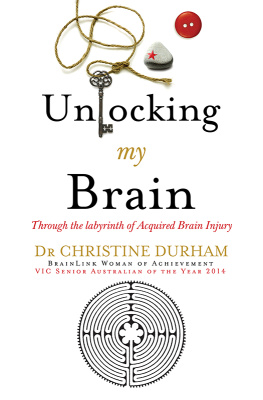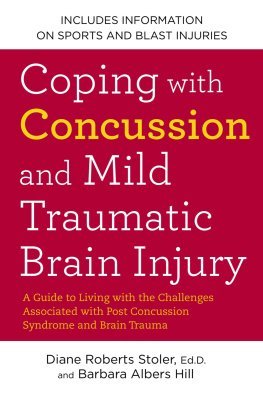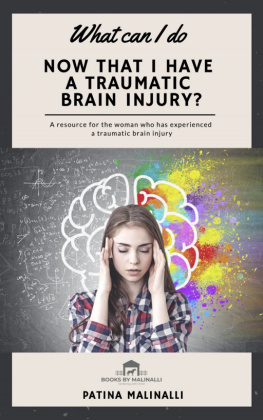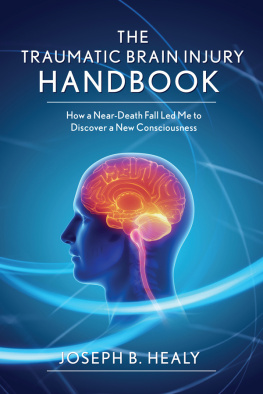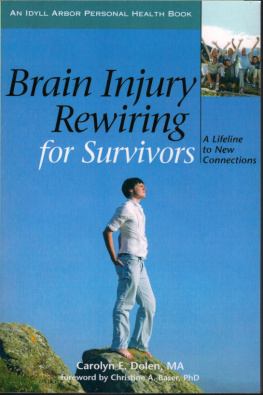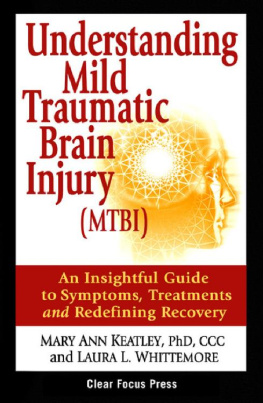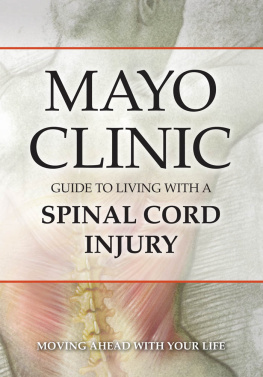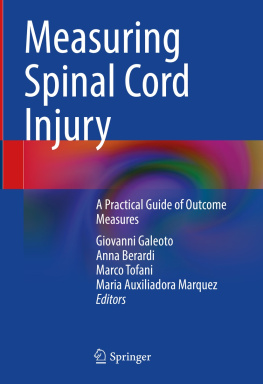Contents
Guide
Page List
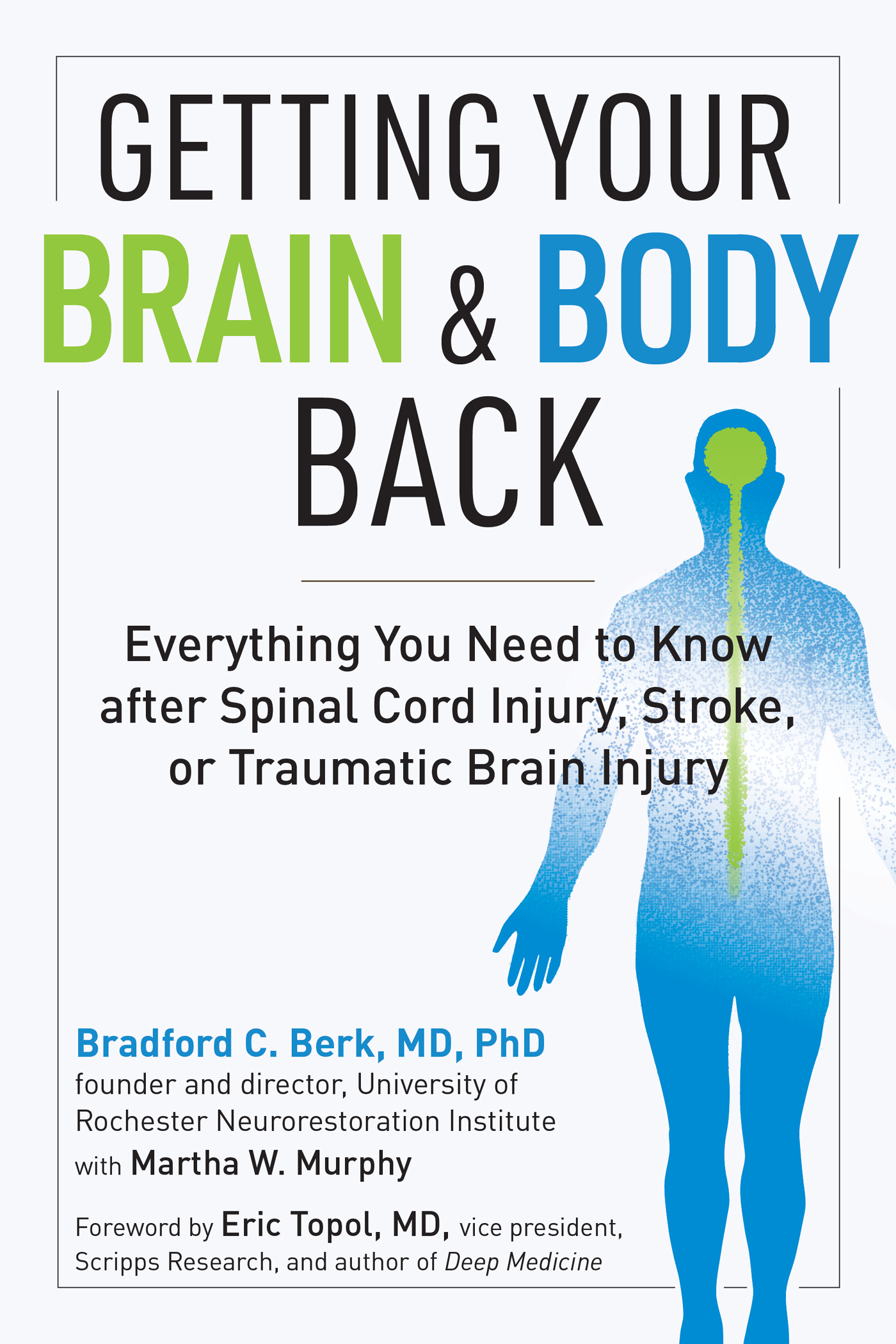
Acclaim for
Getting Your Brain And Body Back
Riveting and compelling. At last, a book of hope for those who have been offered little in the past. Dr Berks inspiring personal story combined with his empowering and evidence-based advice make this a must-read for those who have suffered catastrophic neurological injury.
Gary Gibbons, MD, PhD, director of NIH National Heart, Lung, and Blood Institute
Dr. Berk is living proof that focused and purposeful mental effort can result in remarkable function, life satisfaction, and contribution to the world. His book provides expert and inspiring guidance for the many people who seek to overcome catastrophic injuries and get back to life.
Robert Califf, MD, former commissioner of US Food and Drug Administration (FDA)
In his engaging and informative book, Dr. Berk puts the focus on patients and families, giving them the tools they need for successful rehabilitation.
Steven Kirshblum, MD, senior medical officer at Kessler Institute for Rehabilitation, chief medical officer at Kessler Foundation, and chair of the Department of Physical Medicine and Rehabilitation at Rutgers New Jersey Medical School
In this important book, drawing both from his personal experience and the latest research, Dr. Berk shows us how to use the mind to restore the body. After thirty-six years of living with a spinal cord injury, finally words of wisdom can be put into practice.
Rob Tortorella, executive chairman of Corrosion Products & Equipment, Inc.

To Coral, who carried me forward to a new life.
To Mariah, Dave, and Sarah,
for their love and support.
To my many friends who unselfishly gave me
their compassion, support, and attention.
To the remarkable health care providers at
the University of Rochester Medical Center,
the Kessler Rehabilitation Institute, and
the Zhongshan Rehabilitation Hospital,
who kept me safe, taught me how to move,
and provided hope.
Contents
PART 1
Your Recovery Begins in Your Head
How to Deal with Your Grief, Depression, and Anxiety So You Can Focus on Recovery
How to Harness the Power of Your Mind with Neuroplasticity for Optimal Recovery
The Five Essentials of Smart Discharge Planning
PART 2
Functional Recovery, Health, and Wellness
Controlling Pain Helps Speed Your Rehabilitation
Five Steps to Getting the Most from Rehabilitation and Restoration Therapies
How to Strengthen Good Habits and Lose the Ones that Zap Your Health
How to Address Your Sexuality, Sexual Function, and Fertility
How to Use Modern Western Medicine and Traditional Eastern Medicine to Heal and Enjoy a Better Quality of Life
PART 3
Preventing and Treating the Most Common Medical Problems
PART 4
Enjoy a Rewarding and Meaningful Life
How to Take Advantage of Life-Enhancing Devices, Tools, and More
Making Your Home, Vehicles, and Workplace Accessible for a Wheelchair
The Good, Bad, and Worst of Traveling in a Wheelchair
How to Thrive in Your Community
Science and Technology Bring the Future to the Now
Foreword
by Eric Topol, MD
B Rad B Erk And I were classmates at the University of Rochester School of Medicine and Dentistry. It didnt take long for memaybe minutesto know he was one of the smartest people Id ever met. Our careers as cardiologists have crossed many times over the ensuing forty-five years weve known each other. Weve both had major career changes, some due to opportunities and others due to necessity. But Brads career has been nothing short of meteoric. Starting as chief of the cardiovascular division at Rochester in 1998, he became the chair of medicine in 2001 and assumed the role of CEO of the University of Rochester Medical Center in 2006.
But when Brads life suddenly changedafter suffering a serious bicycle accident that left him a quadriplegicthat didnt hold him back.
He made a remarkable recovery and returned one year later to his role as CEO. After many accomplishments, he stepped down in 2015 to found the University of Rochester Neurorestoration Institute. Brad anticipated a dramatic change in neurorehabilitation, beyond the obvious personal meaning. He realized that devices would replace drugs for treatment of many neurological diseases and that these new technologies would promote neuroplasticity and recovery, changing millions of lives.
After his accident, Brad realized there was a paucity of information on the practical aspects of recovery from spinal cord injury, stroke, and traumatic brain injury. Thats why this book hes written is so important. He refers to these three diseases as acute neurological injuries (ANI), due to their sudden onset and profound impact on daily life. Specifically, hes recognized the many features common in all ANIs, especially the psychological trauma. Finally, he foresaw the future advances in neurorehabilitation and the need for people to be prepared by keeping themselves as healthy as possible.
I empathize deeply with Brad, especially when it comes to the difficulties of finding proper resources to make decisions about your medical problems. In my most recent book, Deep Medicine, I tell the story of my own rehabilitation after a total knee replacement. I was born with a rare disease called osteochondritis dissecans. But the surgeon who replaced my knee didnt take my condition into account and prescribed the usual rehabilitation: aggressive movement of the knee to maintain full range of motion. Unfortunately, in my case, this caused reoccurrence of the cartilage and bone damage, leading to scar tissue. Thankfully, I was able to find someone with expertise in developing a rehab program that would work for me. As Brad emphasizes throughout this book, you and your family should be as educated as possible, so you can assemble a team that addresses your problems comprehensively and competently. This book will help you do just that.
A key feature of this book is the identification of similar problems among people who suffer an ANI. In particular, many people experience depression, frequently accompanied by anxiety. The modern-day poster children for ANI are individuals who experience a traumatic brain injury (TBI), such as our soldiers in Afghanistan and Iraq injured by explosive devices, and football players whose brains show evidence of a disease called chronic traumatic encephalopathy (CTE) and who often die by suicide as a result. Brad points out how important it is to treat these twin hurdles of depression and anxiety, so we dont lose valuable time for rehabilitation immediately after injury.
He also discusses two novel concepts regarding neurorehabilitation: continuous rehabilitation and the use of integrative medicine. The benefit of continuous rehabilitation is evidenced by Brad himself, who chronicles his slow-but-steady improvement in regaining many aspects of his prior life, including sports such as cycling and skiing, and daily physical therapy and exercise. Particularly interesting for me was his discussion of integrative medicine; he recommends incorporating several aspects of traditional Chinese medicine as complements to Western medicine.
While I found the whole book fascinating, the last chapter in part four was the most enjoyable, since my own three books all dealt with how novel technology influences medicine. This is an exciting time for neurorehabilitation, and Brad combines the best elements of the past with a carefully justified focus on future therapies.


